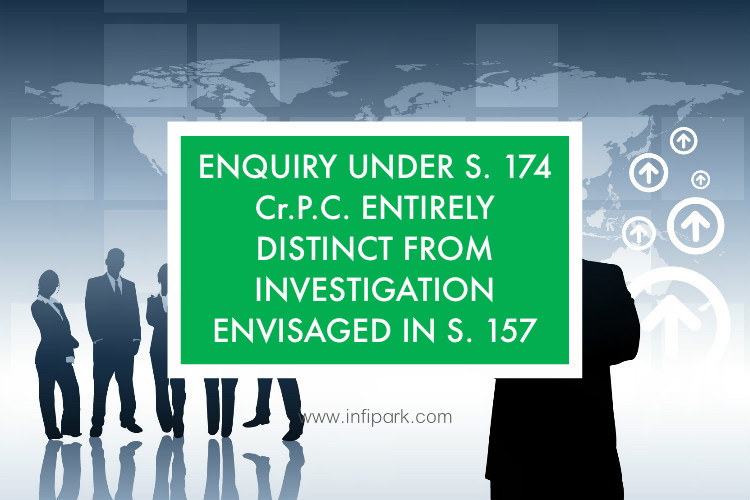MANOJ KUMAR SHARMA-THEAPPELLANT (ACCUSED), WHO was serving in the Indian Air Force at the relevant time, got married to one Nandini on 27.04.1999. On 20.09.1999, Nandini Sharma (since deceased) committed suicide at her matrimonial home. The information with regard to the same was lodged by the Security Officer of the Indian Air Force at Police Station Mulana, District Ambala. On 22.09.1999, post mortem was conducted on the body of the deceased and the body was handed over to the relatives for performing last rites.
On 22.09.1999, the officer in-charge of the investigation, P.S. Mulana submitted a report being No. 26 stating that there was no sign of foul play in the occurrence. On the basis of the investigation, on 24.01.2000, a Final Report was submitted before the sub-Divisional Magistrate which got accepted on 19.02.2000. Simultaneously, a Court of Inquiry (CoI) was also convened to investigate into the alleged role of the appellant-accused but after completion of the Inquiry the case was finally closed on 25.07.2000.
After five years of the closing of the above case, a fresh First Information Report (FIR), being No. 194 dated 29.05.2005 was got registered by Shri Shashi Bhushan Sharma (Respondent No. 2 herein) – brother of the deceased against Manoj Sharma- appellant No. 1 herein, Heera Lal Sharma, Mahaveer Prasad Sharma and Smt. Hem Lata Sharma-the father, uncle and mother of the appellant No. 1 herein respectively at P.S. Bhillai Nagar, District Durg under Sections 304B, 498A and Section 34 of the Indian Penal Code, 1860 (in short ’the IPC’).
Being aggrieved by the filing of the FIR, the appellants herein filed a Writ Petition being No. 2890 of 2005 before the High Court. The Division Bench of the High Court, vide order dated 25.07.2005, directed for the continuance of the investigation of the alleged offence.
On 04.04.2007, the said writ petition was withdrawn with the leave of the court and the appellants herein filed Criminal Miscellaneous Petition being No. 612 of 2007 before the High Court under Section 482 of the Code of Criminal Procedure, 1973 (in short ’the Code’) for quashing of the FIR. Learned single Judge of the High Court, vide order dated 17.10.2011, allowed the proceedings to continue with a direction to the police to hold fair and proper investigation to ensure logical conclusion of the same without unnecessary delay.
An application for modification being Criminal Misc. Petition No. 732 of 2011 was filed for modification of the order dated 17.10.2011 in Criminal Miscellaneous Petition 612 of 2007 on the ground that during the pendency of the judgment in the matter , the chargesheet came to be filed by the police before the court which was allowed vide order dated 17.11.2011.
Further, the appellants herein filed Criminal Misc. Petition being No. 765 of 2011 under Section 482 read with Section 397 of the Code before the High Court for quashing of charge sheet and cognizance taken thereof by the Judicial Magistrate First Class, Durg dated 03.09.2011 and 13.10.2011 respectively in Criminal Proceeding No. 805 of 2011 arising out of Crime No. 194 of 2005 registered at P.S. Bhilai Nagar, District Durg. Learned single Judge of the High Court, vide order dated 27.09.2012 dismissed the petition filed by the appellants herein.
Against the judgement of the High Court special leave petition was filed. The Supreme Court quashed FIR No. 194 dated 29.05.2005 and thus the criminal proceeding against the appellants were dropped for want of prosecution. Consequently, the appeal was allowed.
The operative part of the judgment reads as under:-
Sections 174 and 175 of the Code afford a complete Code in itself for the purpose of “Inquiries” in cases of accidental or suspicious deaths and are entirely distinct from the “investigation” under Section 157 of the Code wherein if an officer in- charge of a police station has reason to suspect the commission of an offence which he is empowered to investigate, he shall proceed in person to the spot to investigate the facts and circumstances of the case. In the case on hand, an inquiry under Section 174 of the Code was convened initially in order to ascertain whether the death is natural or unnatural. On a careful scrutiny of materials on record, the inquiry which was conducted for the purpose of ascertaining whether the death is natural or unnatural cannot be categorized under information relating to the commission of a cognizable offence within the meaning and import of Section 154 of the Code. On information received by P.S. Mulana, the police made an inquiry as contemplated under Section 174 of the Code. After holding an inquiry, the police submitted its report before the sub-Divisional Magistrate, Ambala stating therein that it was a case of hanging and no cognizable offence is found to have been committed. In the report, it was also mentioned that the father of the deceased-R.P. Sharma (PW-1) does not want to take any further action in the matter. In view of the above discussion, it clearly goes to show that what was undertaken by the police was an inquiry under Section 174 of the Code which was limited to the extent of natural or unnatural death and the case was closed.
We are of the opinion that the investigation on an inquiry under Section 174 of the Code is distinct from the investigation as contemplated under Section 154 of the Code relating to commission of a cognizable offence and in the case on hand there was no FIR registered with the P.S. Mulana neither any investigation nor any report under Section 173 of the Code was submitted. Therefore, challenge to impugned FIR under Crime No. 194 of 2005 registered by P.S. Bhilai Nagar could not be assailed on the ground that it was second FIR in the garb of which investigation or fresh investigation of the same incident was initiated.
It is true that territorial jurisdiction also is prescribed under sub-section (1) of Section 156 to the extent that the officer can investigate any cognizable case which a court having jurisdiction over the local area within the limits of such police station would have power to enquire into or try under the provisions of Chapter XIII. However, sub-section (2) makes the position clear by providing that no proceeding of a police officer in any such case shall at any stage be called in question on the ground that the case was one which such officer was not empowered to investigate. After investigation is completed, the result of such investigation is required to be submitted as provided under Sections 168, 169 and 170. Section 170 specifically provides that if, upon an investigation, it appears to the officer in charge of the police station that there is sufficient evidence or reasonable ground of suspicion to justify the forwarding of the accused to a Magistrate, such officer shall forward the accused under custody to a Magistrate empowered to take cognizance of the offence upon a police report and to try the accused or commit for trial. Further, if the investigating officer arrives at the conclusion that the crime was not committed within the territorial jurisdiction of the police station, then FIR can be forwarded to the police station having jurisdiction over the area in which the crime is committed. But this would not mean that in a case which requires investigation, the police officer can refuse to record the FIR and/or investigate it. Chapter XIII of the Code provides for “jurisdiction of the criminal courts in inquiries and trials”. It is to be stated that under the said Chapter there are various provisions which empower the court for inquiry or trial of a criminal case and that there is no absolute prohibition that the offence committed beyond the local territorial jurisdiction cannot be investigated, inquired or tried.
A reading of the aforesaid sections would make it clear that Section 177 provides for “ordinary” place of enquiry or trial. Section 178, inter alia, provides for place of enquiry or trial when it is uncertain in which of several local areas an offence was committed or where the offence was committed partly in one local area and partly in another and where it consisted of several acts done in different local areas, it could be enquired into or tried by a court having jurisdiction over any of such local areas. Hence, at the stage of investigation, it cannot be held that the SHO does not have territorial jurisdiction to investigate the crime. But after the investigation is over, if the officer arrives at the conclusion that the cause of action for lodging the FIR has not arisen within his territorial jurisdiction, then he will forward the case to the Magistrate concerned empowered to take cognizance of the offence.
In the instant case, the suicide was committed at Ambala. The Ambala police closed the case after fulfilling the requirements of Section 174 of the Code holding that there was no foul play in the incident and also there was no requirement of lodging FIR under Section 154 as none of the family members of the deceased raised any suspicion over the death even though the death was committed within seven years of marriage. Also, there is no evidence of it being a continuing offence. Hence, the offence alleged cannot be said to have been committed wholly or partly within the local jurisdiction of the Magistrate’s Court at Durg. Prima facie, none of the ingredients constituting the offence can be said to have occurred within the local jurisdiction of that Court.
In the case on hand, as per the materials on record, in Crime No. 194 of 2005, charge sheet has been filed and the Judicial Magistrate First Class, Durg has taken cognizance of the proceedings. In the present fact situation, we are of the considered opinion that the Court at Durg has no territorial jurisdiction to try the case and the proceedings are liable to be quashed on the ground of lack of territorial jurisdiction since the entire cause of action for the alleged offence had purportedly arisen in the city of Ambala.
Such extraordinary delay in lodging the FIR raises grave doubt about the truthfulness of allegations made by Respondent No. 2 herein against the appellants, which are, in any case, general in nature. We have no doubt that by making such reckless and vague allegations, Respondent No. 2 herein has tried to rope the appellants in criminal proceedings. We are of the confirmed opinion that continuation of the criminal proceedings against the appellants pursuant to this FIR is an abuse of the process of law. Therefore, in the interest of justice, the FIR deserves to be quashed.
We are of the considered opinion that the allegations made in the FIR are inherently improbable and the evidence collected in support of the same do not disclose the commission of any offence and make out a case against the appellants herein. Further, to invoke inherent jurisdiction under Section 482 of the Code, the High Court must be fully satisfied that the material produced on record is based on sound, justifiable and reasonable facts. In the case on hand, malicious prosecution was instituted by the brother of the deceased after a period of five years that too on the basis of anonymous letters. There was no accusation against the appellants before filing of the FIR. The allegations are vague and do not warrant continuation of criminal proceedings against the appellants. Also, the court at Durg has no territorial jurisdiction because cause of action, if any, has arisen in Ambala. The criminal proceeding is grossly delayed and a result of belated afterthought. The High Court failed to apply the test whether the uncontroverted allegations as made prima facie, establish the offence. It is also for the court to take into consideration any special features which appear in a particular case to consider whether it is expedient and in the interest of justice to permit the prosecution to continue. The High Court did not apply its mind judiciously and on an incorrect appreciation of record, ordered for continuance of the investigation on a petition under Section 482 of the Code. This power must be exercised judiciously and not capriciously or arbitrarily, as any improper or capricious exercise of such power may lead to undesirable results.
Reference : Supreme Court. Manoj Kumar Sharma & Ors. v. State of Chhattisgarh & Anr., Criminal Appeal No. 775 of 2013 [From the Judgment and Order dated 27.09.2012 of the High Court of Chhattisgarh at Bilaspur in Crl. M.P. No. 765 of 2011].











